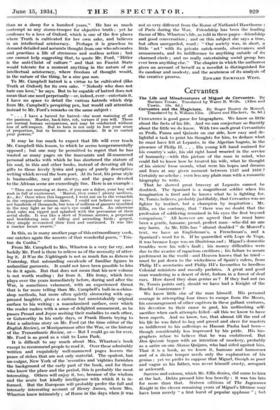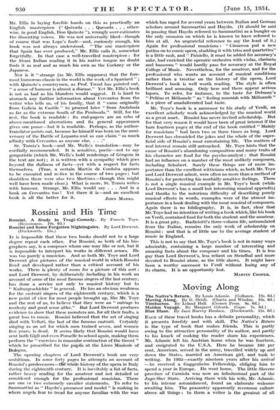Cervantes
CERVANTES is good game for biographers. We know so little about the facts of his life. And we can conjecture so fluently about the little we do know. With two such great Cervantists as Profs. Panza and Quixote on our side, how easy and de- lightful a task to print his thoughts for him, to deduce what he must have felt at Lepanto, in the Algerian bagnio, in the presence of Philip II. . . . His young left hand maimed for his country's sake, his old right hand wearied in the service of humanity—with this picture of the man in mind, who could fail to know how he treated his wife, what he thought of his sisters' loose morals, what were his hopes and dreams and fears at any given moment between 1547 and 1616 ? Certainly no scholar ; even less any plain man with a romantic biography to write.
That he showed great bravery at Lepanto cannot be doubted. The Spaniard is a magnificent soldier when his imagination is fired and he knows what he is fighting for. Sr. Tornfts believes, probably justifiably, that Cervantes was no fighter by instinct, but a champion by inspiration ; Mr. Ellis, en the contrary, that " there was no doubt that the profession of soldiering remained in his eyes the first beyond comparison." All however are agreed that he must have been a gentle, humane, proud, perfect man—who did no one any harm. As Mr. Ellis has " almost doubled " de Monvel's text, we have an Englishman's, a Frenchman's, and a Spaniard's word for it. if he quarrelled with Lope de Vega, it was because Lope was an illustrious cad ; Miguel's domestic troubles were his wife's fault ; his money difficulties were
due to the avarice of rapacious creditors ; his failure to secure preferment in the world—and Heaven knows that he tried— must be put down to the wickedness of Spain's rulers, from Philip II's secretaries and Philip III's favourites to heedless Colonial ministers and rascally prelates. A great and good man wandering in a desert of debt, forlorn in a forest of deaf ears. How dared they shun genius so ? If they had not (as Sr. Tomas points out), should we have had a Knight of the Rueful Countenance ?
We know little else of the man himself. His personal
courage in attempting four times to escape from the Moors, his encouragement of other captives in these gallant ventures, his devotion to their cause in gaol, his unflinching self- sacrifice when such attempts failed—all this we know to have been superb. And we know, too, that almost till the end of his life he was fated to beg and grovel and slave for masters as indifferent to his sufferings as Hassan Pasha had been— though considerably less impressed by his pride. His bio- . graphers refuse to believe that he was embittered. But Don Quixote began with an intention of mockery, probably as a satire on one Alonso Quijano, who had sided against him. That it is a book, as we know it, humane and humorous
and of a divine temper needs only the explanation of his genius : yet we prefer to suppose that Miguel, though as poor and vague as his father, was never himself crusty, arrogant or awkward.
Success and esteem, which Mr. Ellis denies, did come to him
at the last. Debts pressed him less heavily : it was too late for more than that. Sixteen editions of The Ingenuous Knight in the eleven remaining years of Miguel's lifetime may have been merely " a first burst of popular applause " ; but
Mr. Ellis in laying forcible hands on this as practically an English masterpiece (" Quixada . . . Quesada . . . other- wise, in good English, Don Quixote "), wrongly over-estimates the dissenting voices. He was not universally liked—though of course that was Lope's fault—and, curiously enough, his book was not always understood. " The one masterpiece that Spain has ever produced," Mr. Ellis calls it, somewhat forgetfully. In that case a well-travelled masterpiece ; for the Sioux Indian reading it in his native tongue no doubt finds it as real and as much his own as the Cockney or the Japanese.
Nor is it " strange (as Mr. Ellis supposes) that the fore- most humorous classic in the world is the work of a Spaniard " ; with Quixote's countrymen, as Prof. Trend has pointed out, " a sense of humour is almost a disease." Yet Mr. Ellis's book is not as bad as his blunders would suggest. It is hard to stomach any further information about Cervantes from the writer who tells us, of his family, that it " came originally from Galicia in Castile " to proceed later " from Andalusia as far as the extreme South of the Peninsula." Still, for the rest, the book is readable : its end-papers are an echo of above-mentioned aberrations and its general appearance gives one pause—but it is readable. Perhaps, as the author. translator points out, because he himself was born on the anni- versary of the Battle of Lepanto and so can claim " as much affinity with Cervantes as anyone else. . . ."
Sr. Tomes's book—and Mr. Wells's translation—may be cordially recommended. It is sensitive, poetic—not to say gongoristic (which Mr. Wells's bold renderings of G6ngora in the text are not) ; it is written with a sympathy which goes beyond the dullness of facts—yet with a respect for facts themselves. (True, a certain Martin de Cordoba appears to be executed and re-live in the course of two pages ; but doubtless there were also two Martins—though this might well have been made clear.) What is more, Sr. Tomas writes with humour. Strange, Mr. Ellis would say . . . And in a book on Cervantes too ! Yet there it is—and an excellent
book is all the better for it. JOHN MARKS.

















































 Previous page
Previous page